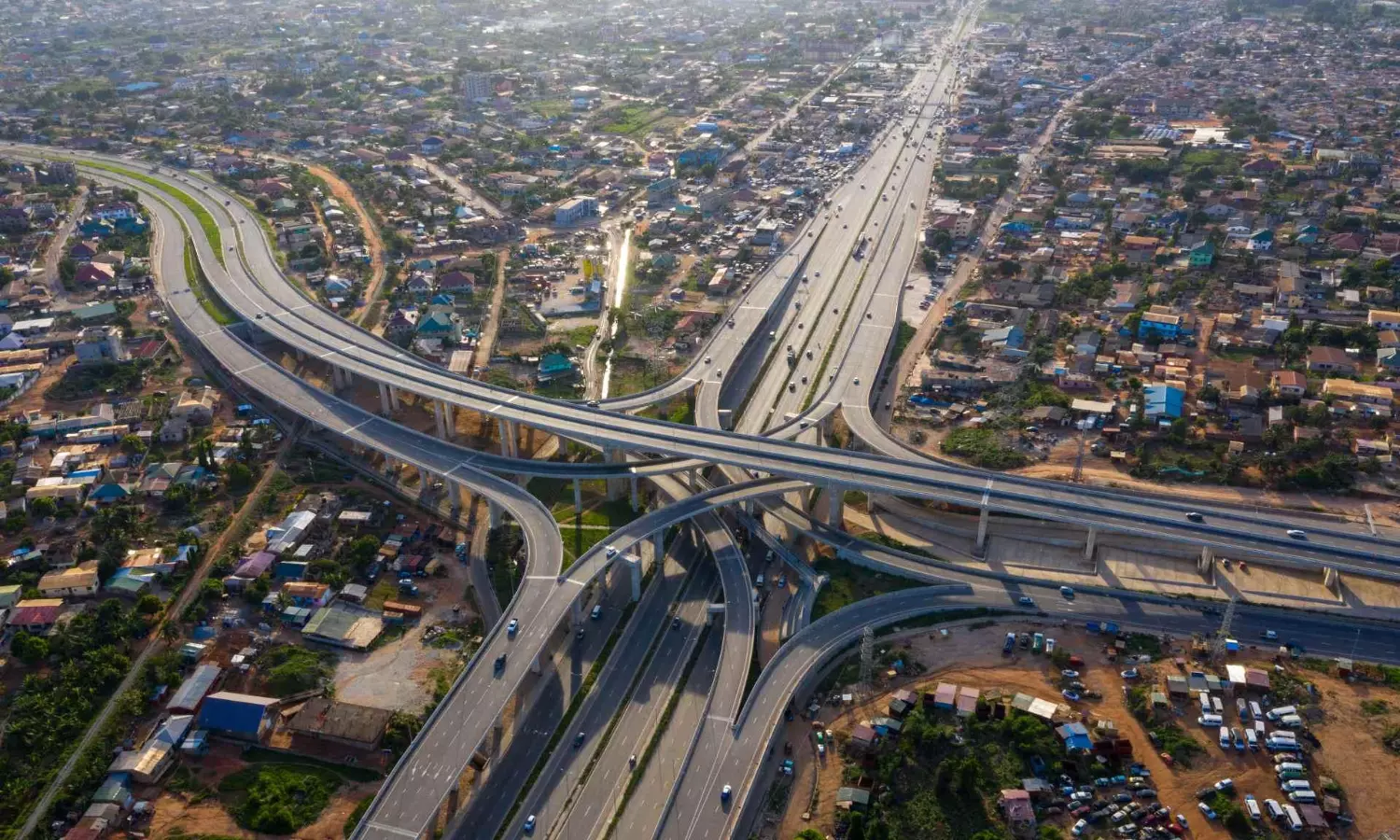Supply chain diversification: Africa's chance to rise

The four-link Pokuase Road junction which is part of Awoshie-Pokuase Road Project commissioned in 2021 in Ghana. (Credit: AfDB)
The current challenges in geopolitics, the world economy and the inherent advantages of the African continent are posing once in a lifetime opportunity for the African continent to emerge as a crucial player in the global supply chains. The African nations and leaders are not intending to miss it.
“The Kenyan Government will intensify its focus on the last mile road connectivity to boost access to resources and services. More funds will be put into the upgrading of roads in a move that will also spur trade at the grassroots. Better roads will guarantee farmers, especially of fresh produce, better income. When we trade more it means more employment opportunities for our youth.”
This is how Kenyan President William Ruto spoke in the second week of January 2024 in Boiman in Ol Joro Orok where he launched the tarmacking of the Boiman – Kwa Mumbi roads.
He said the 44-kilometre stretch is a lifeline to the milk, vegetables and potatoes farmers in the County as it connects them to better markets.
The words of the Kenyan President showcase the urgency and importance with which the African nations and leaders are thinking about their infrastructure and logistics capabilities to go forward.
In fact, an African Development Bank (AfDB) report in October 2023 pointed out that Africa’s significant road infrastructure deficit creates increased production and transaction costs that must be addressed to scale opportunities envisaged under the African Continental Free Trade Area (AfCFTA).
Between 2004 and 2022, AfDB provided over $13 billion to finance regional road corridor projects. As a result, close to 18,022 kilometres of climate-resilient, regional highways have been built on 25 road corridors, along with 27 one-stop border post facilities and 18 bridges. Some of these corridors were built as part of the Trans-African Highway network under various continental and regional infrastructure development programs including the Program for Infrastructure Development in Africa (PIDA).
Mike Salawou, director department infrastructure and urban development, AfDB, writes in the report, “These efforts are yielding impressive benefits. Ten years after the Bank financed the Bamako - Dakar highway, a part of the Bamako – Dakar corridor to the tune of $400 million, the route now carries more than 50 percent of Mali’s import and export goods, to and from the port of Dakar. This has allowed the country to diversify its trading routes, reduce costs by more than 20 percent and increase international trade by 10 percent.”
“The Kazungula Bridge project along the North-South corridor connecting Botswana, Zambia, Namibia, and the Democratic Republic of Congo (DRC), has led to a reduction in waiting time for customs entry clearance from 14 days to just one hour. The Mombasa - Nairobi - Addis Ababa - Djibouti corridor has received more than $1 billion from the Bank. The road now allows Ethiopia to trade at least 20 percent of its freight more competitively through the port of Mombasa. Equally, bilateral trade between Ethiopia and Kenya has increased by 400 percent. The Bank injected $420 million to finance approximately 950 km of roads along the Nacala Corridor linking Zambia and Malawi to the Nacala Port in Mozambique, facilitating regional trade among the three countries, providing landlocked countries with access to ports and maritime services, thus reducing transport costs by 15 - 25 percent,” he added.
“The Kenyan Government will intensify its focus on the last mile road connectivity to boost access to resources and services. More funds will be put into the upgrading of roads in a move that will also spur trade at the grassroots.”
William Ruto, Kenya
While Kenya understands the lack of road infrastructure in the country and the importance of building roads, it is also engaged in coordinated efforts to mitigate supply chain challenges in the country. For instance, the country launched Kenya National E-commerce Strategy 2023 and adopted trade facilitation and logistics as one of its six strategic initiative pillars.
The report also acknowledges the logistics challenges which include the lack of a national addressing system, the quality of the rural road infrastructure, the need for networks of warehouses covering all counties, the availability of interoperable tracking and tracing services and appropriate regulation and monitoring.
The report reads, “The government’s role will be to facilitate the development of logistics hubs by ensuring that sites are available in strategic locations and that the existing hubs and warehouses can be expanded and adapted to the needs of e-commerce. Ideally, they will be placed next to trunk routes for ease of access and at regional airports to stimulate the use of airfreight for e-commerce packages. The Ministry of Roads and Transport and The Ministry of Investments, Trade & Industry will work with county governments to ensure that sites are available so that the whole country can be served.”
“Warehousing and logistics hubs will conform to standards for such facilities to ensure that goods handling and vehicle loading and unloading can be undertaken safely and efficiently. The sites themselves will need space for ease of access and truck movements. Internal spaces will need capacity for inbound and outbound logistics, warehousing and fulfilment (unpacking and packing). Such logistics hubs are likely to be large and become major employers locally. Space requirements will need to take account of growth in the size of such hubs as the market develops,” it added.
The African continent possesses the potential to emerge as a significant player in the global supply chains of automobiles, mobile telephones, renewable energy, and healthcare and the current challenges in the global economy present opportunities for African governments and businesses to position the continent to tap this potential.
Abundant in critical minerals essential for high-tech and environmentally friendly products, Africa is characterized by a youthful and tech-savvy population, a flexible workforce, and a growing middle class. AfCFTA provides additional benefits by facilitating access to regional markets and strengthening production chains across the continent, thereby enhancing the preparedness of domestic industries for the global stage.
Nevertheless, addressing supply chain obstacles in African countries requires proactive policy measures. These challenges include issues such as inadequate logistics, low levels of technology, fragmented markets, limited access to capital, and the presence of weak institutions and regulations.
“Ten years after the AfDB financed the Bamako - Dakar highway, a part of the Bamako – Dakar corridor to the tune of $400 million, the route now carries more than 50 percent of Mali’s import and export goods, to and from the port of Dakar."
Mike SALAWOU, AfDB
In an August 2023 report titled “Economic Development in Africa Report 2023,” the United Nations Conference on Trade and Development (UNCTAD) noted that Africa's role in technology-intensive global supply chains is expected to be increasingly important due to the growing demand for specialized materials and given their abundance on the continent.
Rebeca Grynspan, secretary-general of UNCTAD, wrote in the forward to the report, “We know that diversified supply chains generate significant economic benefits for the countries they connect, reduce inflationary pressures, contribute to increased stability and prosperity worldwide, and open new domestic and regional markets. We believe that such perspective for supply chain diversification provides new opportunities for African economies to position themselves as geographic alternatives and optimize their strategic value for future leading-edge supply chains.”
In the report, Oulimata Sarr, the then minister of economy, planning and cooperation of Senegal, appealed to African decision-makers, governments, financial partners and international organizations, the African private sector, to implement all appropriate means and supply chain network diversification strategies that will increase Africa’s competitiveness and attractiveness and will help convince global companies to make Africa a top destination.
“This is undoubtedly an asset and a challenge in the deployment and implementation of AfCFTA, with a significant impact on regional value chains,” she said.
The most important factor influencing Africa’s potential to be a global supply chain leader is the abundance of critical minerals and metals, including aluminium, cobalt, copper, lithium and manganese, vital components in technology-intensive industries.
The UNCTAD notes that this advantage positions the continent as an attractive destination for manufacturing, as recent upheavals caused by trade turbulence, geopolitical events and economic uncertainty compel manufacturers to diversify their production locations.
“For instance, the Democratic Republic of the Congo, which holds about 46% of the world’s cobalt, is venturing into producing cathode precursors – a main component in batteries,” reads the UNCTAD report.
Meanwhile, South Africa introduced the Freight Logistics Roadmap to address the inefficiencies in its current supply chain and reform the logistics system in the long run.
Speaking during a post-Cabinet media briefing after approving the roadmap in December 2023, the minister in the presidency Khumbudzo Ntshavheni said the current challenges in the industry “pose a significant constraint” on the South African economy, its growth prospects and job creation.
“The immediate priority is to stabilise and improve the operational performance of the freight rail network, which presents a severe constraint on exports. The main implementation mechanism for the short-term interventions will oversee operational improvement through five corridors, with full alignment with the Transnet board-approved turnaround plan which identifies short and medium-term actions to improve operations and stabilise the company’s finances,” she said.
Compared to other parts of the world, Africa as a continent has many disadvantages in its logistics infrastructure and supply chain system. However, the current geopolitical issues, macroeconomic challenges and the trend of supply chain diversification is the chance for Africa to change its fortune. The policy initiatives and leadership seem to be on track to achieve with the help of its inherent advantages including the abundance of raw materials and young workforce.
This feature was originally published in the Jan-Feb 2024 issue of Logistics Update Africa


